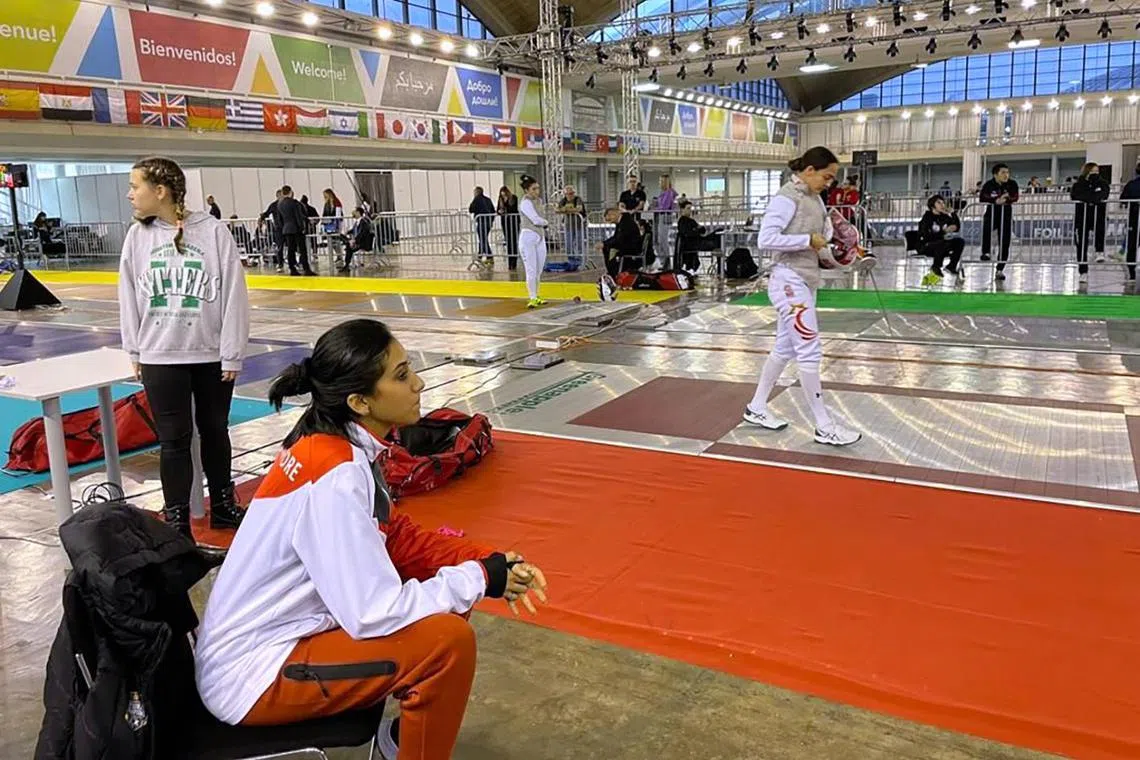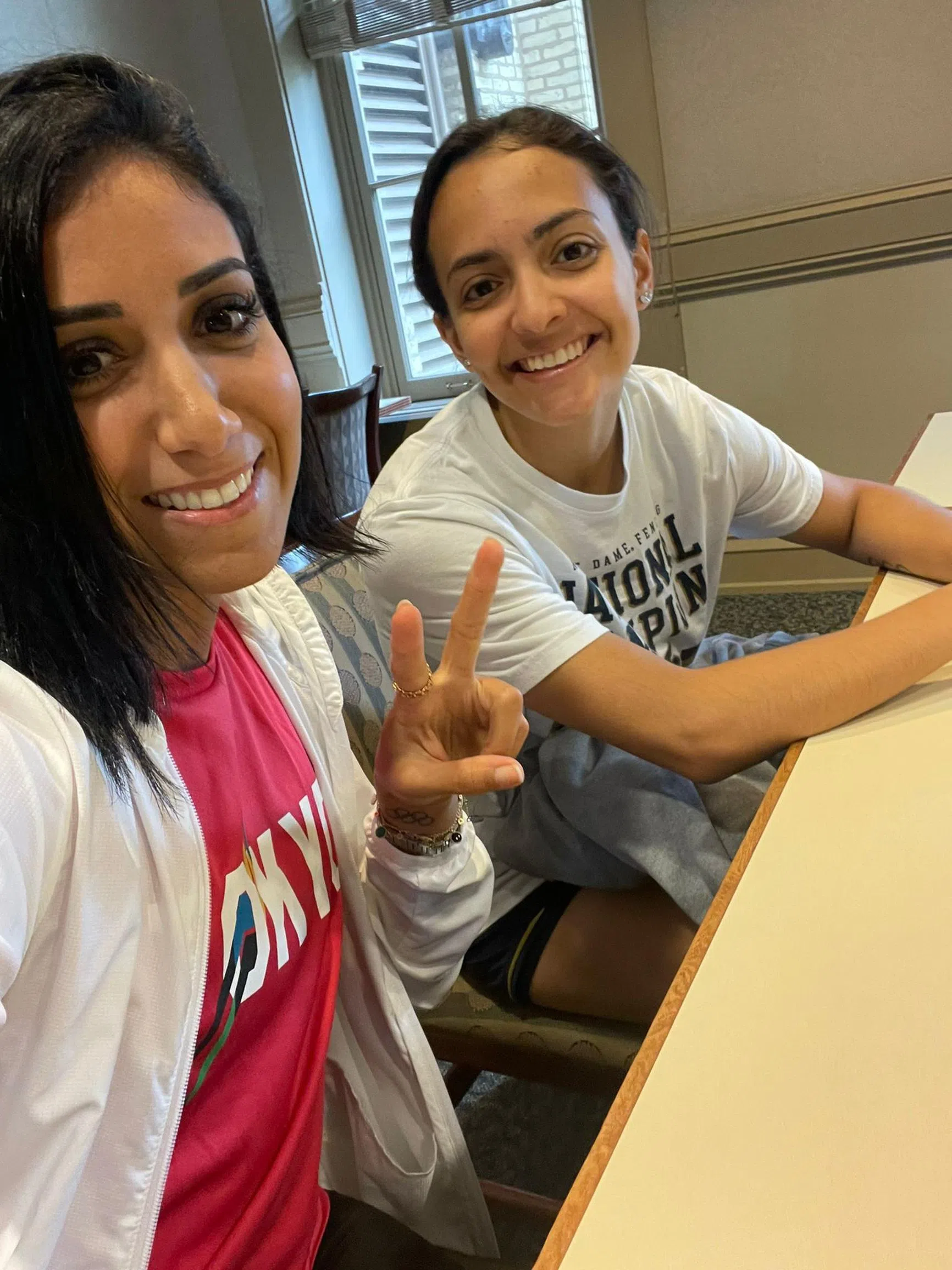Inspired by new coach, Singapore fencer Amita Berthier targets Olympic glory
Sign up now: Get the biggest sports news in your inbox

Ines Boubakri (sitting) keeping a close eye on Singaporean fencer Amita Berthier at the Foil World Cup In Serbia in December 2022.
PHOTO: AMITA BERTHIER
SINGAPORE – On Singaporean fencer Amita Berthier’s left forearm is a tattoo of the Olympic rings, inked after her maiden outing at Tokyo 2020.
She is eyeing a more valuable memento in 2024: her first Olympic medal. If successful, the 22-year-old will become the first Singaporean fencer to win a medal at the Olympic Games.
And she will have the perfect mentor and coach to help her achieve success in Paris: Ines Boubakri, who made history for Tunisia at Rio 2016 by winning her country’s first Olympic fencing medal – a foil bronze.
Boubakri, who also has a tattoo of the five Olympic rings on her wrist, has a matching necklace to go along with her ink.
It is a memory she cherishes after making history for Tunisia in Rio.
The 34-year-old, who retired after the Tokyo Olympics, has been working with Berthier since last August.
She will be in the Singaporean’s corner during the July 22-30 World Fencing Championships in Milan, where Berthier will compete in the women’s foil individual and team events.
“I’ve never been in a situation where I’ve worked with someone that has recently retired.
“It is a new experience for me, but something that I think that has worked out very well,” said Berthier.
She is aiming to earn direct entry to the Paris Games as one of the top two fencers in the Asia-Oceania region.
“She has competed with the same opponents that I’m competing with now so the information, advice and experience that she can provide me, gives me an advantage.
“She’s also left-handed so she can see things from my perspective.”

Ines Boubakri (left) with Singaporean fencer Amita Berthier during a training camp in France.
PHOTO: AMITA BERTHIER
Berthier will also continue to work with Amgad Khazbak, who coached her during her time at the University of Notre Dame, from which she graduated in May.
But, as Khazbak is also coach of top American fencer Lee Kiefer, he is unable to be in Berthier’s corner during major competitions such as the Olympics and world championships owing to a conflict of interest.
Berthier initially reached out to Boubakri at the last world championships and the duo have been working on honing her craft since.
This has allowed the Singaporean to draw from a mix of fencing styles. While Khazbak’s style is more aggressive and focuses on fencing from a further distance, Boubakri specialises in the French style, with priority on technique and closer sparring distance.
Boubakri said: “It’s makes her more powerful when she has different kinds of styles. This is only going to make her a much stronger fencer.
“Opponents can be lost because they won’t know which style she may take, she can even switch styles in her bouts.”
But it is off the piste that Berthier has benefited and her newfound mentality is already evident. Her best performance at the world event was a round-of-32 finish in 2017 and 2019, and she is not afraid to target a podium finish in Italy this time.
Berthier, who won a joint-bronze at the Asian Fencing Championships
“I need to stop looking at top 16 or top eight. Every competition I go to, I need to go out there and believe that I can make the podium because I have beaten some really good fencers. I know I’m capable of doing it.”
Boubakri, who has a master’s degree in sports psychology, has been working with Berthier on confidence and mental fortitude. At the highest level, it can decide between a win or a loss, she stressed.
She said: “When I was young, when I talked about the Olympics, people thought it was a joke and doubted me. They said ‘you will never reach this Olympic level and get a medal’. But if you deeply believe in yourself, you can do it.
“Tunisia and Singapore are similar in that sense, we don’t have a (fencing) tradition and we are small countries that don’t have what the French or Russians have.
“But I broke this barrier and I told Amita it does not matter where you come from, have the belief that you can do it.”



